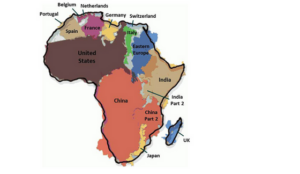|
Getting your Trinity Audio player ready...
|
Africa is a continent with immense potential, but it also faces a number of challenges. These challenges include poverty, hunger, disease, and conflict. However, these challenges can also be seen as opportunities for growth and development. Here are some examples of Africa’s challenges and how they can be transformed into opportunities.

Poverty
Africa has the highest poverty rates in the world, with over 400 million people living on less than $1.90 per day. However, poverty can also be seen as an opportunity to create new businesses and jobs. For example, social enterprises are businesses that are designed to solve social or environmental problems. Social enterprises can be a powerful tool for alleviating poverty and creating a more equitable society.
Hunger
Africa has the highest rates of food insecurity in the world, with over 250 million people facing hunger. However, hunger can also be seen as an opportunity to invest in agriculture and food production. Africa has a lot of arable land and a growing population, so it has the potential to become a major food producer.
Disease
Africa is home to a number of infectious diseases, such as HIV/AIDS, malaria, and tuberculosis. However, disease can also be seen as an opportunity to invest in healthcare and research. Africa is a young and growing continent, so investing in healthcare is essential for its future development.
Conflict
Africa has a long history of conflict, which has had a devastating impact on its development. However, conflict can also be seen as an opportunity to build peace and reconciliation. Peacebuilding is a complex process, but it is essential for Africa to achieve its full potential.
These are just a few examples of how Africa’s challenges can be transformed into opportunities. By investing in education, healthcare, infrastructure, and social enterprises, Africa can create a more prosperous and equitable future for its people.
Political Instability
Political instability and governance issues have been a recurring challenge in Africa. However, these challenges can be viewed as a foundation for fostering good governance and transparency. By promoting democracy, enhancing accountability, and ensuring the rule of law, Africa can establish a conducive environment for economic growth, attracting both local and international investments.
Healthcare Disparities
Healthcare disparities are prevalent across the continent, ranging from inadequate healthcare facilities to a shortage of medical professionals. These challenges present an opportunity to prioritize healthcare reforms and innovations. By leveraging technology and investing in healthcare infrastructure, Africa can potentially build a robust healthcare system, ensuring better health outcomes and economic growth.
Economic Inequality
Economic inequality remains a pressing issue in Africa, with a wide gap between the affluent and the impoverished. However, this very divide can serve as a catalyst for change. Implementing policies that foster inclusive growth and create opportunities for entrepreneurship can narrow the economic gap and drive sustainable development, benefitting a broader segment of society.
Infrastructure Deficits
Africa faces a significant infrastructure deficit, encompassing transportation, energy, healthcare, and information technology. Inadequate infrastructure hampers economic growth and development. However, this very gap presents a golden opportunity for investment and innovation. By channeling resources into building robust infrastructure, Africa can set the stage for sustainable development, attracting both local and international investors.
Investments in transportation infrastructure, such as roads, railways, ports, and airports, can facilitate trade and connectivity. Renewable energy projects can provide a clean and sustainable power supply, simultaneously addressing energy shortages and environmental concerns. Advanced healthcare facilities and a reliable information technology network can bridge the healthcare gap and promote innovation.
Education Barriers
Access to quality education remains a challenge in many parts of Africa. The shortage of educational institutions and skilled educators inhibits human capital development. However, this dearth of educational facilities offers a chance to revolutionize the education sector. By investing in accessible and quality education, Africa can nurture a skilled workforce, fostering innovation and productivity across industries.
Empowering teachers through training and providing resources can elevate the standard of education. Enhancing digital literacy and incorporating technology into education can ensure that students are prepared for the digital age. Scholarships and grants can make education more accessible, encouraging aspiring students to pursue higher studies.
Conclusion
Africa, despite its challenges, possesses immense potential and opportunities for growth and development. By shifting our perspective and viewing these challenges as opportunities in disguise, we can pave the way for a brighter future. Through strategic planning, innovative solutions, and collaborative efforts, Africa can rise above its challenges and become a beacon of progress and prosperity on the global stage.
You will find the following information useful: